Become the ultimate Yellow Golden Back Shrimp keeper with this insightful aquarium care guide! In this article you will find everything from feeding and tank setups to breeding and health care!

Want some golden stripe aquarium shrimp in your home tank? Let’s take a look at one of the most stunning freshwater shrimp species.
The Yellow Golden Back Shrimp is a bright and captivating variety of Neocaridina shrimp. It is famous for its iridescent bright yellow body and distinctive golden stripe, making it a unique sight in any aquarium. This vibrant yellow shrimp is a popular choice among aquarists as a perfect addition to any freshwater tank.
In this article, we will explore the history, physical features, breeding pattern, and care requirements of the yellow golden back shrimp.
Origins and Breeding Evolution of Yellow Golden Back Shrimp

It’s only fitting that the stunning Yellow Golden Back Shrimp has a rich history. This Neocaridina variety is native to the freshwaters of Taiwan and has migrated to different regions of the world thanks to years of collection and keeping by curious hobbyists, who have helped to keep the Yellow Golden Back Shrimp lineage active.
The evolution of yellow shrimp and their unique ability to retain their distinct coloration is a result of years of selective shrimp breeding, which has preserved the genetics of the golden stripe. This ensures that the visually captivating appearance of the yellow golden back shrimp remains the highlight in any tank.
Distinctive Physical Characteristics of Yellow Golden Back Shrimp

The Yellow Golden Back Shrimp is a unique aquarium shrimp with distinctive physical characteristics that grab any viewer’s attention. The golden stripe Neocaridina is decorated with a bright yellow shrimp exoskeleton and distinctive golden stripes that run along its back down to its tails.
These stunning features contribute to its striking appearance, which has kept the Yellow Golden Back Shrimp on the list as one of the most popular Neocaridina varieties in recent times.
Essential Care Requirements For Yellow Golden Back Shrimp
Yellow Golden Back Shrimp Care is essential in keeping them healthy and retaining their radiant color.
Keeping the ideal water parameters is essential for a perfect molting process, breeding success, color maintenance, and general shrimp survival. Next is keeping them in the right tank size to give them enough room for swimming and breeding season.
Additionally, a larger tank (for their small size) between 5-10 gallons promotes better water stability for shrimp and a better filtration ease to free the tank of toxins.
Maintenance routines such as regular water changes, keeping the pH level between 7.2 – 7.6, deep cleaning of their tanks, and quarantining infected shrimp contribute to better shrimp health maintenance.
The temperature in the tank should range from 64° – 80° F (17.8° – 25.5° C), GH(General Hardness) between 4-8 and KH(Carbonate Hardness) between 3-15.
Creating The Ideal Tank Setup For Yellow Golden Back Shrimp

Yellow Golden Back Shrimp tank setup requires paying close attention to all the following details in the upcoming sections to create the right environment for your aquatic pets.
Lighting

Introduce proper lighting in your tank to show off your shrimp’s vibrant appearance. LED lighting is great for shrimp aquariums because it mimics the lighting situations of their natural habitat in a cost effective manner.
Filtration

An effective water filtration system should be installed to keep the aquarium’s water clean, remove harmful chemicals, and trap particles. Sponge filters are perfect for these small shrimp tanks; they are gentle filters that won’t cause strong water currents that stress shrimp.
Decor

Shrimp-friendly tank decor, such as live plants, algae, and smooth surfaces such as driftwood, can enhance the tank’s aesthetics and provide places for the shrimp to explore and hide during breeding season.
Feeding and Nutrition for Yellow Golden Back Shrimp
A nutrient-filled shrimp color-enhancing diet is crucial for maintaining the yellow and golden coloration of yellow Golden Back Shrimp.
Placing this Neocaridina on balanced shrimp nutrition that includes algae, biofilm, and specialized shrimp pellets while building a consistent feeding schedule promotes a regular supply of nutrients vital for supporting shrimp health and agility in the tank.
For more on feeding your aquatic pets check out The Ultimate Guide to Fish Food: Pros and Cons & Best Choices!
Another nutrient-rich feeding tip is adding supplements to the shrimp’s diet, such as calcium, to help build stronger shells. You can also leave molted shells in the tank for your Yellow Golden Back Shrimp fry to consume.
Lifespan of Yellow Golden Back Shrimp
The average Yellow Golden Back Shrimp’s lifespan is about two years, but extending shrimp life is possible with proper care.
Proper water conditions, diet, and the overall tank environment influence shrimp care longevity; by cultivating healthy shrimp practices, hobbyists can help their shrimp live a long, vibrant life.
Common Health Issues and Prevention Strategies
Yellow Golden Back Shrimp health is another area to prioritize if you keep them in your home tank. The following are the most common diseases that may affect your Yellow Golden Back Shrimp.
Parasitic Infections (Vorticella, Scutariella)
Cause: Poor water conditions, introducing infected shrimp into water
Symptoms: White growth on the shrimp’s body, usually near the head or gills
Prevention: Adding treatment to water, improving water quality
Solution: Hydrogen peroxide dosing or salt dips
Bacteria Infection
Cause: Water quality problems, excess waste in water
Symptoms: Cloudy patches on shrimp’s shell
Prevention: Keeping the tank clean through regular water changes
Solution: Administer antibiotics
Molt Issues
Cause: Calcium-deficient diet, incorrect water parameters
Symptoms: Incomplete molting, incessant molting
Prevention/Solution: Feeding the shrimp a calcium-rich diet and ensuring stable water parameters
Shrimp Disease Prevention Tips
You can keep your Yellow Golden Back safe with effective shrimp health monitoring. Here are some more tips:
- Maintain clean and stable water conditions
- Maintain shrimp wellness through the separation of infected shrimp
- Regular water changes and testing.
We recommend using a master test kit like the one form amazon linked below to frequently test your water parameters.
Breeding Yellow Golden Back Shrimp: Key Insights
As a potential or actual owner of yellow golden back shrimp, you are responsible for protecting this unique variety and multiplying it healthily.
Breeding yellow shrimp is integral to increasing their population and preserving their golden stripe traits, which they’re renowned for. A dedicated breeding tank setup is necessary to aid intensive shrimp fry care and ensure there are more than enough yellow golden back shrimp for generations to come. Keep in mind if the shrimps feel threatened, they may not breed.
This video has been very helpful in identifying the sex of Neocaridina Shrimp, I highly recommend it when trying to determine the sex of your breeding pairs:
The golden yellow shrimp are eager breeders; provide them with stable water conditions and sufficient food, and they’ll do their thing. Once the shrimp breed, it takes two weeks for the eggs to gestate; then, they begin feeding from the same food source as their parents and consistently molt during the early stages.
When it comes to social shrimp interactions, the Yellow Golden Back Shrimp are friendly and interact seamlessly with other species in a tank.
These beauties usually move in groups, which exhibits their natural behavior; you may also find your shrimp hiding among plants to feel safe and secure, especially during breeding season.
When choosing shrimp tank companions, consider small, peaceful fish like Tetras, Rasboras, Nerite snails, and Guppies. Larger and more aggressive fish fail the community tank compatibility test with shrimp because they may eat or harm them.

Overall, the Yellow Golden Back Shrimp behavior in a community tank will never be a source of worry to any fishkeeper due to their peaceful demeanor. However, closely monitor other tankmates for aggressive behavior towards your shrimp as that is more likely.
Conclusion
Caring for Yellow Golden Back Shrimp is a thrilling experience for any aquarist. Our Unique shrimp species insights offer a view into yellow shrimp’s easy care requirements and compatibility with other species, making them a great addition to any aquatic lineup.
If you’re passionate about enhancing your tank’s aesthetics, adding this vibrant shrimp in aquarium will definitely get the job done. You’re surely one step closer to being the perfect Yellow Golden Back shrimp owner if you stick to the details in this insightful guide.


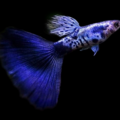
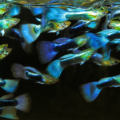
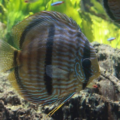
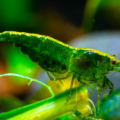
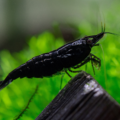
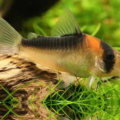
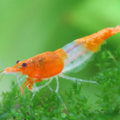
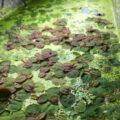
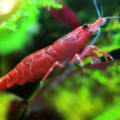
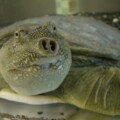
1 thought on “The Striking Yellow Golden Back Shrimp: A Complete Aquarium Guide ”